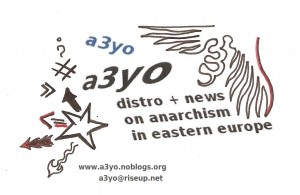(source: http://danskantiracistiskfront.wordpress.com/2011/03/13/extradition-impossible-immediate-release/ )
(short explanation: Denis is accused of participating radical ecological
demonstration outside Khimki city administration in Russia 28th of July
2010. Read more about the case here: http://khimkibattle.org/?lang=en)
Statement of the “No Borders” Project of the Social Action Center
concerning the detention of a refugee Denis Solopov.
Send the letter to the General Prosecutor of Ukraine – here.
http://noborders.org.ua/en/files/2011/03/petition_to_General_Prosecutor_of_Ukraine_ENG.pdf
Denis Solopov came to Ukraine in search of asylum from persecution by
Russian Federation authorities. He turned to the UN High Commissioner on
Refugees (UNHCR) office in Ukraine for protection. Having studied his
case, UNHCR came to the conclusion that criminal charges pressed against
Denis in Russia carried a political character.
The primary goal of UNHCR in Ukraine is to assist the government of
Ukraine in creating an effective national refugee protection system. In
accordance with the Ukrainian Law “On Refugees”, Denis therefore turned
to Ukrainian authorities with asylum claim, which he submitted to the
Migration Service in Kyiv (MSK). Denis presented the same documents to
KMS that he presented to UNHCR, hiding nothing — even the fact that he
is wanted by Russian Federation for association with the «Khimki case».
Unlike UNHCR, the State Committee on Nationality and Religion of Ukraine
(SCNR) — being responsible for deciding upon Denis’s Ukrainian asylum
application — nevertheless came to the conclusion that Denis has no
basis for fearing persecution in the Russian Federation, and declined to
provide him with refugee status in Ukraine.
It is difficult to judge why SCNR’s decision differs so radically from
the position of UNHCR: notification regarding rejection in status handed
to Denis by KMS on 2 March 2011 does not contain any explanation of the
rejection except a scant reference to Article 10 of the Ukrainian Law
“On Refugees”. Unfortunately, only one thing becomes clear: the asylum
system in Ukraine — despite the hopes of UNHCR — cannot pretend to be
effective and functional, while asylum seekers’ requests are denied even
without any explanation.
Moreover: what happened to Denis after he received the rejection
demonstrates that the refugee protection system in Ukraine exists as but
a trap for refugees, easing their transfer into the hands of their
persecutors. On 2 March 2011 – when Denis was presented with the
rejection – the KMS arranged his «meeting» with the police who detained
him right at the doorstep of the Migration Service to secure his handing
over to the RF. Nothing else can explain the circumstances of Denis’
apprehension. The place where refugees come to seek protection has been
turned by Ukrainian authorities into detention spot.
However, the KMS and Ministry of Internal Affairs did not end up alone
in their zeal to secure Denis’s transfer into the hands of his
persecutors. On 4 March 2011, Kyiv’s Solomenskyi court ignored an
important fact when inspecting the issue of his temporary arrest with
the goal of extradition to Russia: handing over Denis — and consequently
his detention in order to secure extradition — is IMPOSSIBLE because he
is a refugee. The court did take into account documents that confirm his
UNHCR-granted refugee status. It also failed to recognize that SCNR’s
failure to grant Denis refugee status is not a final determination of
his status in Ukraine and had been already appealed under legal
procedure. The court likewise decided to simply «overlook» the assertion
of the defense that handing over Denis to the RF presents a real risk
that he will be subjected to torture, or to inhumane and degrading
treatment. Failing to at all take into consideration the above facts,
the court simply noted that it did not observe any circumstances that
would extradition of Denis Solopov, and ordered his temporary arrest for
40 days.
The Ukrainian court system — as is too often the case — proved to be not
only blind, but also deaf. The court ignored not only the defense’s
arguments, but also international human rights standards together with
the norms of Ukrainian law itself. “Competent authorities” may recall
that Article 466 of the Criminal Procedure code of Ukraine (CPU) says
that a refugee (regardless whether he/she was recognized as such by
Ukraine, UNHCR, or another government) — MAY NOT BE transferred to a
foreign state where his health, life, or freedom may be in danger.
Moreover, in accordance with Article 3 of the European Convention on
Extradition, a transfer is not executed if there exists enough basis to
assume that a request for extradition was made with the intent to
persecute or punish a person based on her political convictions. In this
case, Article 5(1)(f) of the European Convention on Human Rights and
Basic Freedoms assumes that as soon as authorities of a State-Party to
this Convention realize or should have realized that a transfer may not
be executed deprivation of liberty securing it ceases to be lawful.
Article 461 of Ukraine’s CPU unequivocally prescribes that a detained
person must be RELEASED IMMEDIATELY if circumstances preventing her
transfer (extradition) were identified.
Ukrainian Authorities must understand that Denis’s extradition is
impossible, at the least because he is recognized as a refugee by UNHCR.
Therefore, he must be RELEASED IMMEDIATELY.
Denis’s lawyer has appealed against Kyiv Solomenskyi Regional Court’s
decision on Denis’s incarceration to a higher court. Will the Court of
Appeal be as blind and deaf as the court of the first instance? Or,
will it “take a back seat” and – despite the requirements of Article
5(4) of the European Convention on Human Rights – put all the
responsibility to consider whether Denis’s extradition to Russia is
possible or not on the General Prosecutor’s Office? While this question
remains unanswered a refugee Denis Solopov is kept in Kyiv City Pretrial
Detention Center, where detention conditions are called “medieval and
inhuman’ even by Ukraine’s own Parliamentary Ombudsman.
(http://noborders.org.ua/en/about-us/news/extradition-impossible-immediate-releas/)




